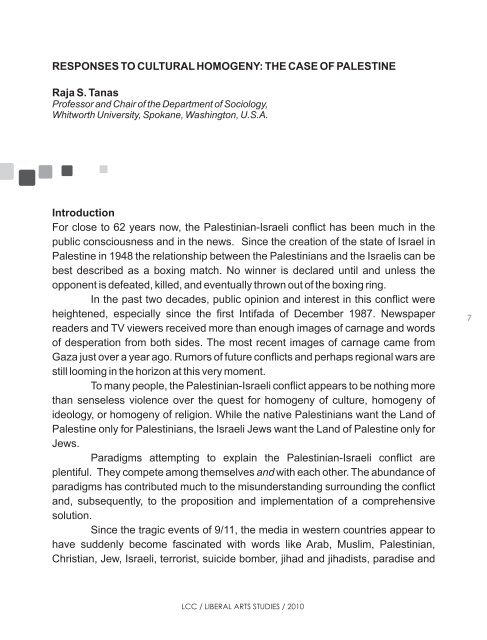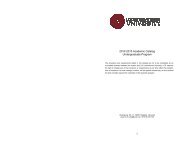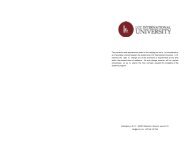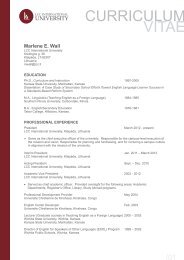lcc liberal arts studies / 2010 volume iii - LCC International University
lcc liberal arts studies / 2010 volume iii - LCC International University
lcc liberal arts studies / 2010 volume iii - LCC International University
You also want an ePaper? Increase the reach of your titles
YUMPU automatically turns print PDFs into web optimized ePapers that Google loves.
RESPONSES TO CULTURAL HOMOGENY: THE CASE OF PALESTINE<br />
Raja S. Tanas<br />
Professor and Chair of the Department of Sociology,<br />
Whitworth <strong>University</strong>, Spokane, Washington, U.S.A.<br />
Introduction<br />
For close to 62 years now, the Palestinian-Israeli conflict has been much in the<br />
public consciousness and in the news. Since the creation of the state of Israel in<br />
Palestine in 1948 the relationship between the Palestinians and the Israelis can be<br />
best described as a boxing match. No winner is declared until and unless the<br />
opponent is defeated, killed, and eventually thrown out of the boxing ring.<br />
In the past two decades, public opinion and interest in this conflict were<br />
heightened, especially since the first Intifada of December 1987. Newspaper<br />
readers and TV viewers received more than enough images of carnage and words<br />
of desperation from both sides. The most recent images of carnage came from<br />
Gaza just over a year ago. Rumors of future conflicts and perhaps regional wars are<br />
still looming in the horizon at this very moment.<br />
To many people, the Palestinian-Israeli conflict appears to be nothing more<br />
than senseless violence over the quest for homogeny of culture, homogeny of<br />
ideology, or homogeny of religion. While the native Palestinians want the Land of<br />
Palestine only for Palestinians, the Israeli Jews want the Land of Palestine only for<br />
Jews.<br />
Paradigms attempting to explain the Palestinian-Israeli conflict are<br />
plentiful. They compete among themselves and with each other. The abundance of<br />
paradigms has contributed much to the misunderstanding surrounding the conflict<br />
and, subsequently, to the proposition and implementation of a comprehensive<br />
solution.<br />
Since the tragic events of 9/11, the media in western countries appear to<br />
have suddenly become fascinated with words like Arab, Muslim, Palestinian,<br />
Christian, Jew, Israeli, terrorist, suicide bomber, jihad and jihadists, paradise and<br />
<strong>LCC</strong> / LIBERAL ARTS STUDIES / <strong>2010</strong><br />
7






